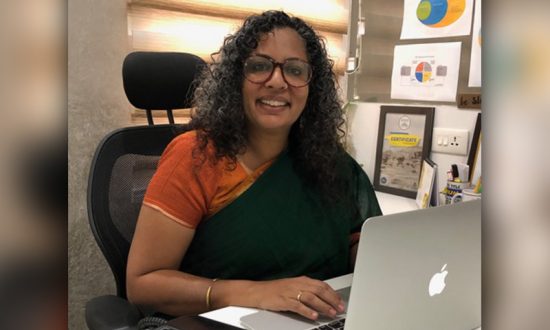A teacher by profession, Anupa Gnanakan has a passion for quality, meaningful, relevant and student-centered education to children from all backgrounds, with a focus on turning schools into places where children feel safe, happy and excited, by inculcating a curiosity to learn and discover.
With a BA in Psychology, Anupa Gnanakan is a trained Montessori teacher who later pursued a Post Graduate Diploma in The Comprehensive Management of Teaching Children with Learning Difficulties, and an MA in Special and Inclusive Education from the University of Northampton. After 15 years of teaching in various schools across Bangalore, she is now the Director – Education at the ACTS Group of Institutions, an NGO that is dedicated to providing quality and accessible education to the community.
The past few weeks have been a whirlwind of adjustments, changes, new learnings, stress, and a shift in the way we think, interact, and function. It’s suddenly all about social distancing, washing hands, wearing a mask, going out only for essentials, and absolutely no public gatherings of any kind. Everything from schools to big IT industries shut down temporarily overnight, forcing everyone to start adjusting to what seems to be becoming the ‘new normal’.
Is this going to go on forever? The way I look at it, the virus will probably go away just as fast as it surfaced, and life might go back to what we were used to before. But this whole situation has got me thinking about the impact that this lockdown has made on the education system. And more importantly, the children.
From teachers not being able to handle a simple smart board effectively, we are now looking at online teaching.
From worrying about children spending too much time on various screens, we are now expecting them to spend all day looking into a screen.
When the virus hit us globally, no one did anything for a while, assuming that this was short-lived and that things would go back to normal. The realization soon dawned on everyone that this virus wasn’t going away in a hurry. Little did we know that the economy, schools, families, and society would be hit so badly.
But life has to go on. And we have to find new ways to keep up.
There is now a new excitement with teachers trying to figure out how they can reach their students with the help of technology, attending webinars to broaden their perspective of online learning, how we can reach students in remote areas with limited connectivity, and a focus on health and hygiene in schools. It’s great to see this surge of enthusiasm in otherwise bored teachers.
As I drove around my neighborhood yesterday on my way to buy groceries, I noticed that many more shops were open again, more people were walking out and about, and more vehicles on the road. Overnight things seem to have gone back to what we were used to.
Is going back to what we were used to a good thing, especially for the education system?
Before the virus hit us, education had become all about the pressure to achieve high marks, stress to compete, the obligation to finish portions, high fees for average education, the mental health of students being brushed aside, a high suicide rate among teenagers, a focus only on academic achievement rather than the all-round development of the student… The list can go on and on.
Were students thriving in this system?
I believe that the ‘new normal’ should be all about building character, responsible global citizens, working on the weaknesses of students, stressing on learning and understanding rather than rote learning, keeping children safe, both emotionally and physically, encouraging students to be problem solvers and critical thinkers, increase collaboration and peer learning… Again, this list can go on and on as well!
Will students thrive in this system?
Will these students grow up into well-rounded adults?
Will these adults contribute responsibly to the society that they live in?
Will our society benefit from such citizens?
My fellow teachers, educators, parents, and friends, as we look ahead, learning from this pandemic that we are in, we have an amazing opportunity to reimagine what our schools can look like. Whether it be online education, the physical classroom, or both, we can learn from this crisis, take what we have learned, and focus on how we can not only recover but recover stronger. And this should be done with a renewed sense of looking at the child and not only the scores, focusing on the overall education of the child, a holistic view of education, the importance of differentiated learning, providing opportunities for all children, cultivating a school culture that is happy, safe and stress-free. Let’s allow students to pause and think. Let’s urge students to ask questions. Let’s encourage students to dream.
A quote by Sonya Renee Taylor that has touched me during this lockdown period – “We will not go back to normal. Normal never was. Our pre-corona existence was not normal other than we normalized green, inequity, exhaustion, depletion, extraction, disconnection, confusion, rage, hoarding, hate, and lack. We should not long to return, my friends. We are being allowed to stitch a new garment. One that fits all of humanity and nature.”




